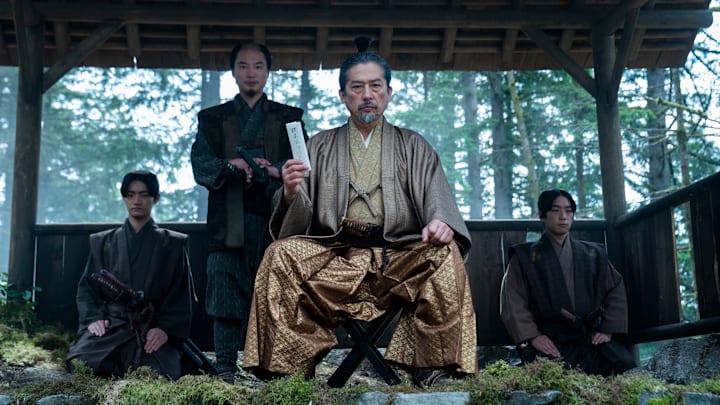Shōgun, the FX/Hulu series based on the 1975 novel of the same name by James Clavell, wrapped up the other day with a devastatingly restrained finale. Instead of a big battle between the forces of Lord Yoshii Toranaga (Hiroyuki Sanada) and Ishido Kazunari (Takehiro Hira), Toranaga pulled off a bloodless coup by turning all of Ishido's allies against him, a plan which required the fan favorite character Toda Mariko (Anna Sawai) to give up her life. Toranaga reveals his master plan to the treacherous Yabushige (Tadanobu Asano) right before Yabushige commits seppeku: with Ishido's allies abandoning him, Toranaga will be able to triumph in a battle yet to come, after which he will be installed as the ruler of Japan, as the shōgun.
Speaking to TheWrap, actor Hiroyuki Sanada confirmed that this battle happens only in Toranaga's “imagination and calculation.” But there is a real analogue for this: the Battle of Sekigahara in 1600, which ushered in the Edo period in Japanese history. "All Japanese audiences know what happened in the past and what Toranaga has done," Sanada said. "Toranaga’s model, [Tokugawa] Ieyasu, won the battle, created the peaceful era over 260 years. So that’s his strategy-revealing scene.”
Choosing to not show the big battle is kind of anathema to the way a lot of big-budget Hollywood movies and TV shows work. We assume everything is leading to a big action scene, which makes Shōgun's choice to end on a quiet note much more powerful. According to co-showrunner Justin Marks, showing the big battle was never part of the plan. "Never for a second in the writer’s room did we ever really say that we were after [a final battle]," he told The Hollywood Reporter. "Not because we couldn’t afford it — although we couldn’t. But because Clavell was not telling that kind of story."
Co-showrunner Rachel Kondo cited Toranaga himself in backing up this decision. “Why is it always that the people who are so eager to go into battle are the ones who have never been in it?” To me, the choice is very refreshing, and only makes me want to watch a second season all the more. But this first season of Shōgun adapts the entirety of Clavell's book, so that's not possible.
...or is it?
Will we get a direct sequel to Shōgun? What about another book in James Clavell's Asian Saga?
As shows like Big Little Lies and Perfect Strangers have proven, it's possible to keep a story after you've adapted the entirety of the source material. Hiroyuki Sanada said that whether that would happen with Shōgun was “not decided yet.”
"Maybe after the release of the 10 episodes we see the reaction. But we finished the novel already. So who knows?"
Showrunner Justin Marks said something similar. "I think if we had a story, if we could find a story, we would be open to it. But I don’t think that anyone ever wants to be out over their skis without a roadmap and everything. And it’s also just about, do people want more of it?"
The answer to the question "do people want more of it?" is a resounding "absolutely yes." The show's reception has been rapturous. The more important question, I think, is whether making up a new story could equal what James Clavell did with his novel, if not improve upon it. "I don’t know if it’s possible," Marks said. "I don’t know if Clavell could have done it either. That’s probably why he moved on to other books too, right? He knew what he had done. Yeah, it’s a tough one."
The better solution seems to be to adapt one of the other books in Clavell's Asian Saga, of which Shōgun is the first of six entries. Each of these books have different casts of characters and are set in different places and times. So we wouldn't reunite with the likes of Toranaga and John Blackthorne, but some of the stories are as compelling as anything in Shōgun.
"Well, I can only speak for myself reading Tai-Pan right now, just apropos of nothing, honestly, and what a great book," Marks said. "I’ve been telling Rachel about it as I’ve been reading it and saying, 'Well! He did it again.' But it’s completely different. It’s about Hong Kong in the early days, a totally different world, so it’s not just playing the hits. He’s conjuring new vivid characters that stand 75,000 feet tall all at once. And I think when you look at Shōgun, that’s part of what Clavell did. We were given these characters who were really so colorful and accessible, which is a hard magic to conjure as a novelist and as a writer."
Personally, I think adapting other books in Clavell's Asian saga is the best path forward. It gives the team the best chance of recapturing the magic of what made Shōgun so good without feeling repetitive or retroactively cheapening what's pretty much a perfect season of television. And given how popular Shōgun has been, I wouldn't be surprised if executives at Hulu and FX weren't having similar thoughts right about now.
To stay up to date on everything fantasy, science fiction, and WiC, follow our all-encompassing Facebook page and Twitter account, sign up for our exclusive newsletter and check out our YouTube channel.
